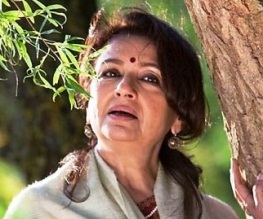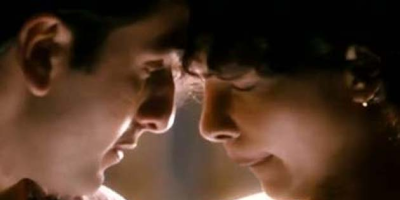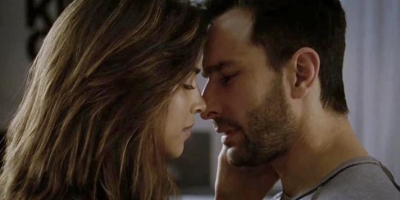Life Goes On

The Banerjees are just like any other affluent British/Indian family – they live in a large house in the outskirts of London, and immerse themselves in art and culture. There are the usual tussles with their three daughters, Dita, Tulika and Lolita, who have been brought up in Britain and are struggling to reconcile their dual nationalities. Nevertheless, the picture painted is one of prosperous domesticity. Sanjay goes off to work as a GP, while saintly wife Manju stays at home, stopping her cooking occasionally to text him the cricket scores. One day, out of nowhere, Manju dies of a major heart attack, and the family must come together in the six days before her funeral to try and cope with their loss.
The film opens with a TV crew documenting an Indian festival in London, and immediately the juxtaposition of Britain and India is conveyed. Bollywood dancers invite disinterested glances from commuters, their bright saris contrasting with the grey skyline, and the reporter covering the story complains of always ‘getting stuck with the Asian news.’ The reporter is Tulika, middle child and the self-proclaimed ‘black sheep’ of the Banerjee family. Aspiring to be a journalist for Sky Sports, she lives in central London with her French girlfriend.
There are undercurrents of European influence running through all three daughters. Dia is performing King Lear (which Life Goes On itself is loosely adapted from) with her white British peers, and Lolita has married Irish stockbroker John. Though the family has seemingly assimilated into their lives in England quite well, there is a continual level of tension between cultures that gives Life Goes On its authenticity. Dita is the youngest and the most prized daughter, but is about to usurp Tulika’s status as black sheep after she finds she is pregnant by her Muslim boyfriend. Lolita, the eldest, is unhappy in her marriage (“what did I tell you would happen if you married outside our religion”, her mother tells her), and feels as if John’s city ambitions have chained her to the home and their two children.
The title Life Goes On refers to the life that must be lived after a deep loss, encompassing both Manju’s death, and the movement forward from the scars of the partition. Sanjay must come to terms with his prejudice against Dita’s boyfriend, a Muslim, and there are some interesting moments and realistic dialogue between Sanjay and his friends as they argue if Muslims deserve their hatred. The band that Dita’s boyfriend performs in is a mixture of Muslim and French, and the 5 minutes of performance was so good that it added another layer to the film. However, there were significant downfalls, both in direction and performance. Tulika’s sexuality and guilt at leaving the family home would have made the most interesting storyline, but unfortunately is badly acted, and there are way, way too many mawkish flashbacks, from the mother playing the sitar, to a cringeworthy segment where Dita and her Muslim boyfriend dance around in a hazy, lilac-filled field. Though political allusion to the partition, which tied nicely in with the central theme of loss, was effective, the desire of director Sangeeta Data to over-sentimentalize left me feeling cold.






Recent Comments